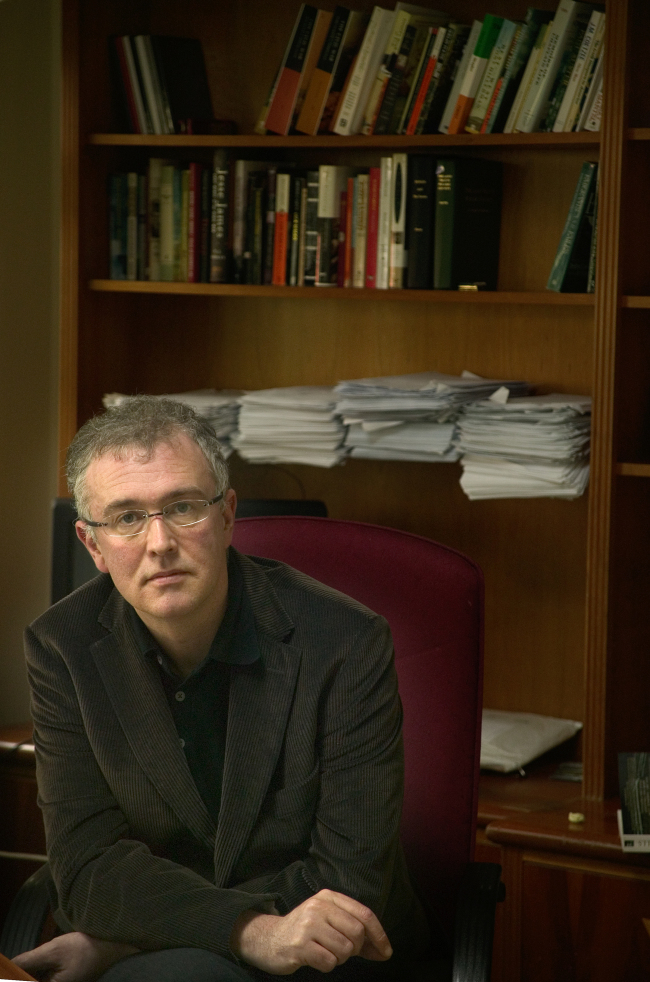TOULOUSE, France (AFP) - When the Irish novelist Joseph O’Connor reads his books aloud he almost sings them. Like his sister, the singer Sinead O’Connor, he is forever searching for “musicality.”
In the famously tumultuous O’Connor household, art was a family affair.
Joseph, the eldest, began writing at 14 and published his first book at 27.
His youngest sister Sinead was a pop sensation at 21, while his other sister Eimear is a well-known painter and art historian.
But there was price to pay. “I hate to say it, but when you’re raised in a turbulent home, it teaches you to look at the world (differently) ... you’re looking down into the bare bones of life very quickly.”
 |
Irish novelist Joseph O’Connor (Official Website) |
The family fell apart when Joseph was 11. Divorce was still outlawed in Ireland and despite his mother’s alcoholism, fathers were almost never given custody of their children.
His parents married young and “they were very unhappy,” O’Connor said. “It was a very destructive place ... a powerful mix if you want your kids to be creative.”
But despite all the shouting and tears, his parents did manage to pass on their profound love of literature and the arts.
“We were lucky to have this cultural inheritance,” said O’Connor, who made his breakthrough internationally with the historical bestseller “Star of the Sea” in 2002.
“The house was full of books, they loved the theatre, they loved music, and they opened the door to that world as a source of pleasure.”
Literature was not O’Connor’s only consolation. He and Sinead “unconsciously encouraged each other,” he told AFP at a books festival in the French city of Toulouse.
Her early success helped him persevere with his writing, he said. “You realize that these sort of things are possible, so (you think) why don’t you give a shot, don’t be scared.
“I think it is also a cultural thing,” he argued.
Whatever pressure Irish parents apply to their offsprings to get good steady jobs,” they would be secretly quite pleased at a child wanting to be a writer. It’s a nice thing about Ireland, people do value the arts, and see it as something we do quite well.”
O’Connor -- who has recently been made a literary ambassador for Ireland by its poet president, Michael D Higgins -- also rejoices in the fact that neither writers nor artists pay tax there.
- Patti Smith soundtrack -
With his friend and fellow Dubliner Colum McCann, O’Connor, a former journalist who wrote a hugely popular weekly radio essay, is regarded as one of the leading male Irish writers of his generation.
But music is still very much the metronome of his existence. He has a vast musical collection and hardly goes a day without listening to a Patti Smith song. And every time he sits down to write he does so as if he was trying to make music.
“If you put yourself in a position of an alien from Mars arriving here, of all the strange things we do, the weirdest is this thing they do with our voices: making noise,” he said.
“It’s the most strange, the most familiar, the most beautiful and the most commonplace of all the art forms,” the jovial writer said.
“Everything (in writing) should aspire to the purity of music, which has no borders, which doesn’t need language ... the laws of physics change, it’s very powerful. I like it when words begin to function at that level, like a piece of music.
“I struggle to get that into my own work, I try to really charge every sentence with musicality,” he declared.
But there is some music he would rather not listen to -- his sister’s.
“I don’t listen to it much because I find it painful. I understand the place of pain that it comes from. I don’t want to be reminded.”






![[Exclusive] Hyundai Mobis eyes closer ties with BYD](http://res.heraldm.com/phpwas/restmb_idxmake.php?idx=644&simg=/content/image/2024/11/25/20241125050044_0.jpg)
![[Herald Review] 'Gangnam B-Side' combines social realism with masterful suspense, performance](http://res.heraldm.com/phpwas/restmb_idxmake.php?idx=644&simg=/content/image/2024/11/25/20241125050072_0.jpg)
